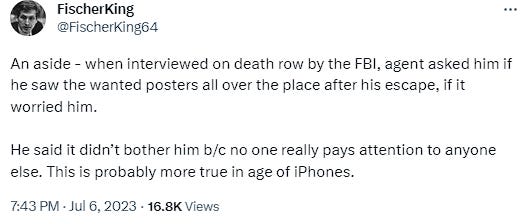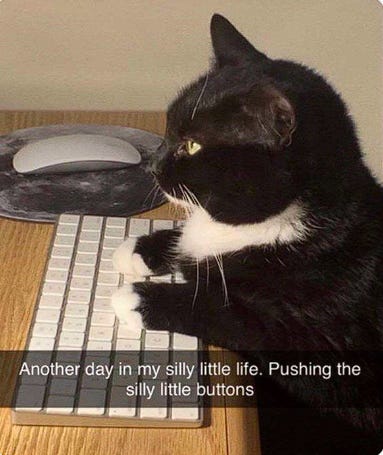M&Ms: Why you should win more.
50 Cent, the rapper, once said something that stuck with me, "Biggie and Tupac were obsessed with death in their songs and interviews. And now they’re both dead. You invite that energy into your life if you always talk about it. That's why you won't catch me talking about dying all time."
I am a lifelong learner and used to be obsessed with learning from my failures. I would dissect my failures and do retrospectives on them. Talk about them proudly; write multi-thousand-word essays about them.
I used to believe that old quote, "I either win, or I learn." And because I loved learning, I thought my failures would always teach me something. So I attracted them to me for their lessons like flies to honey.
But all my failures brought me was more failure. And they didn't bring me any lessons I could build on top of.
One of the core things I learned from the live Small Bets class that helped me win a lot more was that there is no lesson in failure worth parsing. Well, there might be lessons in failure, but many times it is nearly impossible to know why you failed; it could've just been bad luck or bad timing, so it is not worth dissecting and dwelling on.
The example in Small Bets used to show that failures teach us little is the returning planes during World War 2. Knowing which areas of returning planes engineers needed to reinforce during World War 2 is counterintuitive.
But with some thought, the engineers figured out that probably planes that didn't come back weren't shot in the red-hole areas. The planes that went down were likely hit in areas the returning planes had not been hit in, so they reinforced that.
But if some planes hadn't returned home in the first place, engineers wouldn't know why planes are going down at all.
Engineers learned nothing from planes that went down in the middle of the ocean.
It is only the returning planes that told them something.
It is only the returning planes that they can reinforce and build on top of.
"In an age of permissionless leverage, judgment, not work, determines success and failure." -Naval
This core lesson in the Small Bets class changed my mindset on failure. You can build on top of a small win. The lesson may not be obvious, but you can build on top of a shot-up project that made a few dollars; you cannot build on top of a project at the bottom of the ocean that made $0.
And by thinking failure had something useful, like a lesson, I was just doing what 50 Cent accused Biggie and Tupac of doing, inviting more of that energy into my life.
You may think this is all woo-woo science, but it's not.
Human psychology is a fickle thing. It is how casinos take advantage of people. If one goes to the casino and wins, if that person’s recency bias is winning, you can bet the animal in them will associate that recent win with good things, and they'll be going back.
So why do you and I associate our most recent side project, startup, or small bet with failure? We won't be trying again if our recency bias is a failure. Some failures can be so demoralizing one may never try again in their whole life. It is better to become stoic to failure; if it happens, it happens, but we don't glorify it. We don't try to parse lessons from it. We don’t invite it into our life. We move on and try to get a small win.
Don't fight your psychology; use it.
Seek out small wins, so your recency bias can be winning. So you can build and reinforce those planes and send them back for more wins. So you can have more real lessons.
Three Tweets: Misery, Wealth, and No One Cares.
There are a lot of people putting up with misery, sacrificing everything, and doing something they hate just for some imaginary future where they might be wealthy and happy.
Nick makes some great points about wealth in this tweet.
The most fascinating thing about these tweets is that people today have paralyzing fears about trying things because of what other people *might* think of them.
But here we have a criminal who realized everyone is so focused on themselves they aren’t even a little worried about catching a murderer, even with fliers around, and he could fly on a plane without issue.
Two tweets from me:
Three Memes: Twitter Clones, Billionaire Beef, Cats
Mark Zuckerberg, and Meta, launched a new app this week called Threads that competes with Twitter.
Funny enough, almost every tutorial out there is a To-Do app or a Twitter Clone. In fact, it is so funny; my brother built one of those.
Anyway, you can catch me on the Threads App here, if you are on it.
Speaking of the beef between Elon and Zuck, Twitter, and Threads, here is a fun video Meme that captures it all well.
Just a cat to remind us of what we might be doing too much of.
-Louie
P.S. You can reply directly to this email; it will get to me, and I will read it.














Great insights Louie!
It seems to me that there is yet another human bias at play here: storytelling. We try to make sense of things, to feel that things happen "for a reason." So, when we fail, we try to find the silver linings in it, to think that "the failure left me something." That's the story we want to hear, instead of "it was just a failure, I lost two years of my life."
Of course, in the "small bets" methodology you don't waste two years of your life, perhaps you loose two weeks or two months tops. But more crucially, you don't justify failure as a way of "getting lessons." We can also learn lessons from success, but very often we do not because we're very busy taking the next step; when we fail, there is a kind of void that is often used for "reflecting" about the lessons from the failure.
It's much more counterintuitive to just accept the failure and move on. It goes against our storytelling nature –but it's by far the best we can do.
Thanks Louie, take care!
Interesting piece about learning from failure. One thought is that if the chances of success are very low, then it's much harder to discern lessons. Another thought is about expectations. If you're looking for a needle in haystack, and all you find is hay - what lessons can you draw? 🤣